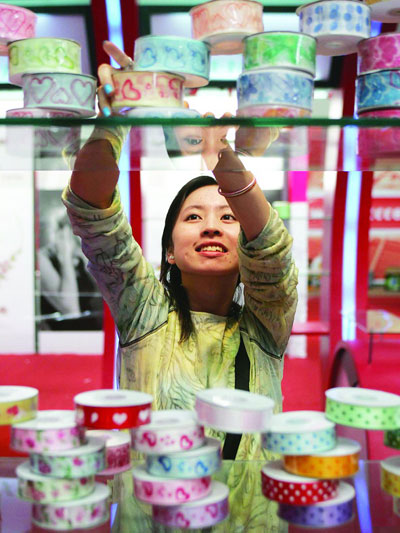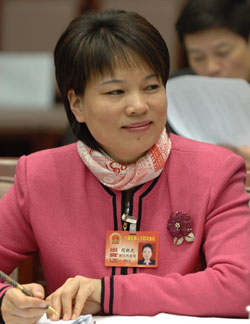Reaching for riches
Updated: 2007-11-05 07:06
 The city of Yiwu is the major production center of China's small goods, such as these cups, which are exported to the world. [China Daily/Gao Erqiang] |
Nearly three decades ago, teenager Zhou Xiaoguang struck it out alone to do small business in Northeast China. She squeezed into a train with two big packages full of embroidered goods. The weight of her load seemed to threaten to put her on the ground. Her face drooped with exhaustion.
The worse part was that the Zhejiang native was too poor to afford a hard berth ticket. So, she spent the following three days sitting in the corner of a carriage door. The place in which she stood was so narrow, she couldn't even stretch her legs and the nearby toilets filled the air with a foul stench.
At that point, Zhou would have given anything to be able to give up and go home.
 |
|
Zhou Xiaoguang worked her way up to become a multi-millionaire. Courtesy of Zhou Xiaoguang |
"I felt as if I was wronged to have to start working as a vendor at such a young age, and people hardly showed their respect. Instead, I become something of a spectacle," Zhou recalls, frowning behind her huge desk. Today, her spacious office takes up a tiny corner of the six-storey building in which she and 28 other family members live and work.
The oldest daughter in the family, who had to work hard to keep her little brother and five younger sisters from starving, has become a billionaire who owns one of the world's largest accessories manufacturing bases in Yiwu, East China's Zhejiang Province.
Currently she employs a workforce of 6,000, and her company's annual export value has reached $30 million over the past few years. Her sales network covers more than 70 nations.
The delegate to the National People's Congress is not sure how many business trips she has made by now - flying first class and staying in five-star hotels - but she vividly remembers her early days when she lived as a vagrant trying to get her business off the ground.
"The experience that came with these hardships is priceless," she says.
The 46-year-old mother of two enjoys having a big family. She and her 28 family members live in the top floor of the family company's six-storey building in Yiwu's Qing Kou Industry Zone .
Everyone has a private bedroom and shares a huge living room, which is spacious enough to play basketball.
Three maids are responsible for the family's daily meals, and two big round tables are set up in the dining room: One is for adults, the other for children.
Except for traveling, the chairperson of the Neoglory China Holding Group (NCHG) seldom eats out and cherishes every chance to dine with her family. After meals, she goes to her office and works late into the night.
"I am always the pillar of my family, while the family members provide emotional support and care for me. We have a wonderful relationship," she says.
Zhou entered the accessories business in 1986, a year after she married Yu Yunxin, who also sold embroidery.
"What I noticed while making my early sales in Northeast China was that local women loved colorful hair ornaments," she recalls.
"I found it inspirational to see that everyone wants to look beautiful, whether she is rich or not. So, I believed the business potential was huge."
The couple bought a booth at Yiwu's Small Commodity City. Her husband was responsible for purchasing material, while she and her sisters manned the booth in the day and processed accessories at night. Sometimes, even her youngest son would make contributions to the family business.
In 1995, they invested several million yuan in opening an accessories factory in response to a call from the local government to develop industry.
"The money was all of our savings from a decade of hard work. I could not help worrying about what kind of life we would face if we failed," she admits.
"But my husband said we could start from scratch, as long as we are diligent and determined."
The company developed dramatically over the following years. However, the management became a headache for Zhou because of her limited educational background.
So, in the late 1990s, Zhou and several local enterprisers enrolled in the Party School of the Central Committee of Communist Party of China, where the countrywoman first learned about human resources and financial management.
Since then, she continued to invest in education for herself, as well as her staff, to keep them on the cutting edge.
She invites experts or professors to teach at the company - paying the highest premiums for the highest quality advice - sometimes for as much as 13,500 yuan ($1,800) per person per day.
Currently, there are more than 4,000 accessories enterprises in the city, 600 of which are run by her former employees.
Rather than reducing prices to remain competitive, Zhou has increased prices to make room for these small enterprises to survive in the market.
"People of same profession don't have to be enemies," she says.
And she says she doesn't worry about other companies copying her products. "They follow me so quickly that it only drives me to move even faster," she adds.
In 2003, the successful businesswoman was elected as a delegate to the 10th National People's Congress. She even put up her own money to fund an advertisement on TV to garnish suggestions from the public so that she could propose them at the congress.
There is no doubt Zhou could enjoy a comfortable life, especially since her elder son, who will soon complete a master's degree in business in Britain, has offered to share her burden. But Zhou has no plans of retiring.
"Running an enterprise is the process of learning and solving problems. From this point of view, I am still learning," she says.
|
|
|
||
|
||
|
|
|
|